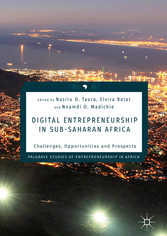Suchen und Finden
Service

Digital Entrepreneurship in Sub-Saharan Africa - Challenges, Opportunities and Prospects
Nasiru D. Taura, Elvira Bolat, Nnamdi O. Madichie
Verlag Palgrave Macmillan, 2019
ISBN 9783030049249 , 252 Seiten
Format PDF, OL
Kopierschutz Wasserzeichen
Geräte
Mehr zum Inhalt

Digital Entrepreneurship in Sub-Saharan Africa - Challenges, Opportunities and Prospects
Foreword
7
Ashok Ranchhod Obituary
10
Contents
12
Notes on Contributors
15
List of Figures
19
List of Tables
21
Part I: Introduction
22
1: Introduction to African Digital Entrepreneurship
23
References
26
2: Innovation Hubs in Africa: What Do They Really Do for Digital Entrepreneurs?
28
2.1 From Internet Access to Impact: The Promise of Digital Entrepreneurship
28
2.2 Africa’s Digital Entrepreneurship Boom and the Rise of Innovation Hubs
31
2.3 Hubs Depend on Entrepreneurs but Participation Is Socially Complex
34
2.4 Do Hubs Make a Difference for Entrepreneurs?
38
2.5 Hub Practice Needs a Dyadic View, Away from Linear Thinking
40
2.6 Conclusion
43
References
43
Part II: Fin-tech: Trust, Legitimacy, and Digital Infrastructure—The Promise, Prospects, and Challenges
48
3: Renegotiating Legitimacy in the Digital Age: Insights from Nigeria
49
3.1 Introduction
49
3.2 “How to Start and Scale-up Digital Enterprises in Africa”: The Challenges of Establishing Legitimacy—Interview with Olalekan Olude
51
Background of Olalekan Olude
51
Interview Extract
52
3.3 The Incumbents’ Advantage and Strategies for Establishing Legitimacy
59
3.4 Digital Banking in Nigeria: Infrastructure, Trust, and Awareness Challenges
60
3.5 The Origins of Nigerian Banking and the Challenges of Legitimacy
62
3.6 Method of Data Collection and Analysis
63
3.7 Findings and Discussion of Results
65
Barriers to Digital Banking in Nigeria: Willingness versus Relational Trust
65
Investment in Digital Infrastructure (Slow but Steady)
67
Digital Infrastructure: How Open Is Good Enough for Healthy Cooperation between Incumbents versus New Entrants?
68
Digital Banking: The Preferred Approaches for Nigerian Incumbent Banks
70
Wema Bank Plc Nigeria: The Legitimacy Journey and Digital Footprints
72
Illustrative Examples of Good Practices: What Can We Learn from Wema Bank’s Digital Banking Strategy, the ALAT?
74
How Wema Bank Actively Uses the Digital Space and Social Media to Establish Legitimacy in a Digital Age
75
3.8 Conclusion: Establishing Digital Legitimacy Is an Active Not a Passive Process
76
References
78
Part III: Media-tech: The Creative Destruction and Reconstruction of African Digital Media
82
4: The African New Media Digital Revolution: Some Selected Cases from Nigeria
83
4.1 Introduction
83
4.2 Historical Timeline of Media Evolution in Sub-Saharan Africa
85
4.3 Nigeria’s Digital Media Landscape
88
4.4 Micro and Technological Entrepreneurship in Nigeria
90
4.5 Method of Data Collection and Analysis
92
4.6 Findings and Discussion
94
Media Use: Profile and Perceptions
94
“Mobile First” Mindset
96
Technological Entrepreneurship as an Enabler of Innovation
97
4.7 Reflections on Prospects
99
References
100
5: The Impact of New Media (Digital) and Globalisation on Nollywood
104
5.1 Introduction
104
5.2 Digital Production
107
5.3 Digital Distribution
110
5.4 Digital Marketing
114
5.5 Methodology
117
5.6 Discussion of Findings
118
Description of Movie Making in Nigeria Since 2008
118
Impact of Digital Technology on Nollywood
121
Nollywood Challenges (Production, Distribution, and Marketing)
122
Suggestions on the Way Forward
124
Other Challenges
127
5.7 Conclusions
132
References
132
Part IV: Animation and Games: Unlimited Opportunities for Exploration
137
6: Shifting Cultural Capital: Kenyan Arts in Digital Spaces
138
6.1 Shifting Cultural Capital: Kenyan Arts in Digital Spaces
138
6.2 Technological Geographies
139
6.3 But Is It ‘Authentic’?
142
6.4 Curating the Virtual
148
6.5 Digital Visibility and Invisibility
151
6.6 Flowing from the Immaterial to the Physical
152
References
153
Part V: Inclusive-tech: Gender Inequality, Poverty, and Digital Ecosystems
157
7: Technopreneurship: A Discursive Analysis of the Impact of Technology on the Success of Women Entrepreneurs in South Africa
158
7.1 Introduction
158
7.2 Women’s Entrepreneurship in South Africa
159
7.3 ICT Infrastructure for Businesses in South Africa
161
7.4 The Digital Gender Divide
164
7.5 The Gender Gap in Business Activities
166
7.6 Women Entrepreneurs in the Digital Era: The myth of high returns
170
7.7 The Future of Women’s Entrepreneurship: The Impact of Automation
173
7.8 Bridging the Digital Divide
176
7.9 Conclusion and Recommendations
179
References
180
8: The Nature of Corporate Digital Agricultural Entrepreneurship in Ghana
185
8.1 Introduction
185
8.2 Literature Review
188
Agriculture in Ghana
188
Agricultural Entrepreneurship
190
Agricultural Technology
192
8.3 Methodology
195
8.4 Findings and Discussions
196
Profile of Corporate Agricultural Entrepreneurship in Ghana
196
Objective One: Improvement of Agricultural Activities Through Technology
197
Objective Two: Nurturing Entrepreneurship Through Technology
199
Objective Three: Challenges Faced by Digital Corporate Agricultural Entrepreneurs in Ghana
200
8.5 Conclusion and Future Studies
201
References
202
9: Agri-tech Opportunities at the Bottom of the Pyramid: How Big Is the Opportunity and How Little Has Been Exploited? Some Selected Cases in Nigeria
209
9.1 Introduction
209
9.2 The Rice Production Policy
211
9.3 Rice Processing in Nigeria
212
9.4 Case Studies: Prime Wave Limited and Al-Wabel Star Trading Company Limited
214
Prime Wave Limited
215
Al-Wabel Trading Company Limited
215
9.5 Analysis and Findings
219
9.6 Conclusions
224
Implications for Policymaking
225
Implications for Rice Paddy Farmers
225
Implications for Digital Entrepreneurs
226
Implications for Research in Digital Entrepreneurship
227
9.7 Recommendations
227
References
229
10: What Next for Digital Entrepreneurship in Sub-Saharan Africa?
231
10.1 Motivation
231
10.2 African Entrepreneurship
234
10.3 Entrepreneurship Ecosystems
239
10.4 Animation and Games
241
10.5 Inclusive Technology
242
Further Reading
243
References
246
Index
251
Shop

